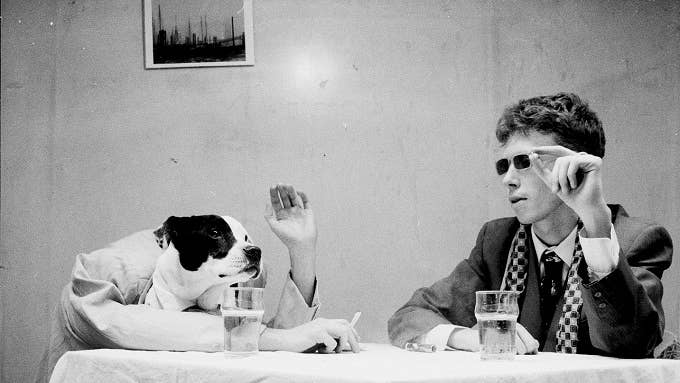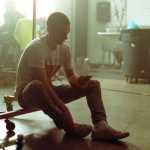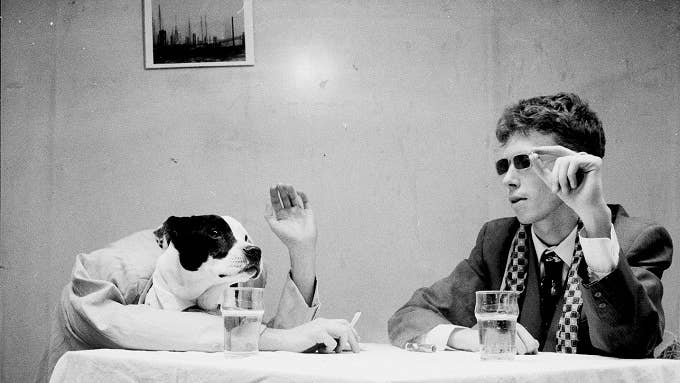
A low profile is hard to come by in 2017. Fame and success, we're told, necessitate engagement, personal appearances, exclusive content, constant attention to the feed.
Or you could do things the King Krule way: break a years-long musical silence with three incredible singles, announce a new album, and reassert your status as a prophet of rock with a NYC press junket that culminates in a raucous after-hours show in a Chinese restaurant. It's been a no-bullshit rollout that we might have called conventional in someone else's hands.
But when the artist born Archy Marshall is at the helm, everything feels a bit surreal. The concert, a sweaty sardine box packed with skaters, fashionistas, and the music journalism illuminati, teetered on the edge of destruction. The floors sagged mightily under the weight of jumping feet, and Marshall's drummer had to intermittently implore the crowd to back up as we bounced closer to the floor-level "stage" during each fresh flurry of Archy's yowling vocals.
The show was a primal experience, well-suited for the songs that make up The Ooz, Marshall's return to his King Krule moniker. It's technically the followup to 2013's 6 Feet Beneath The Moon, though 2015's A New Place to Drown—a collaboration with Archy's brother Jack—offered new music under his government name.
That project cemented Marshall's proficiency as an experimental artist. The Ooz secures his place as an ingenious songwriter. From the drowsy "Czech One" to the stark, snarling "Dum Surfer," the London-born artist has cultivated his roots as a bluesman into something uniquely Krule.
Let's talk about the title. The Ooz was an art exhibition you did with your brother a couple of years back, is that the only connection?
My brother Jack was in a band called Words Backwards, and I was in a band called Zoo Kid. We got together with a guy named Jacob Reid, and we formed Zoo Kid backwards, which became Dik Ooz. It astounded me that it actually came out as Dik Ooz. So The Ooz sort of came out through that.
Jacob and my brother are great illustrators, and I also illustrate a bit. I wanted to get a comic going called Ooz Comics, but I never really did it. A New Place to Drown was a big deal for me and Jack because it was the first big print thing we had done.
Something physical that you can hold in your hands.
That’s what’s lacking in a lot of stuff these days, and that pisses me off. Yes, you can stream any album and have it on your phone—when you have internet—but when do you get that moment that you slide on a record, and put the needle down. It’s gospel… I also like the idea of dust and skin getting on the record.
Have you heard of this idea of making yourself into record after you die? They spread your ashes on wax…
Well, I’m definitely going to do that. I’d never heard of it, but it makes sense. Records were originally made from shellac, which is beetle shells. It's like—have you ever seen the film Brighton Rock? Check the '50s film Brighton Rock. It’s got David Attenborough’s brother in it, Richard. He’s playing Pinkie, and it’s a gangster story. In the film, it’s in Brighton, and he records this voice memo for this girl. He’s a psychopath, and he records this thing where he’s like, ‘I love you so much, but I’m going to kill you,’ he goes into this dark shit. And then right at the end of the film—actually, I shouldn’t give it away. But you’ll see.
You were living alone for a while, right? And then you moved back home, was that to finish the album?
I moved out mid-tour… I was in Japan, and I just called up a bunch of dudes around my ends to take my shit out. It was because I couldn’t really afford it when I wasn’t living there, it just didn’t make sense.
Is it comfortable, being back in your original home base?
Well, that’s the thing. I came straight off tour, so I never got to experience a last night in my own apartment. The first thing I did was go home to the room where I was born. I make love to girls in the same bed where I was born, it’s so fucked up, man. [Laughs] I’m still there now, mainly because I’m not going to get a better deal anywhere else. I’ve got two rooms to work in.
London’s changed a lot since I moved back. I could have moved out when I first moved back, but it just got worse and worse, more and more expensive.
Do you think you could live anywhere else?
It’s always been a desire, but I don’t have a driver’s license. That’s the only thing stopping me, getting a driver’s license. Cities, yeah, but I kind of want to go somewhere more obscure, create a scene again, create music and get people more interested. So much is going on in New York, I want to go somewhere where I can be anonymous. I think I’d be successful at it, it’s just a big step to do when you have all your shit around. Now I’m about to go out on the road for another year, so…
Ideally there’s some sort of rich patron who already has all the furniture and studios set up.
I don’t know, I want to be that guy. I had a dream three nights ago when I was in L.A., it was so weird, I was like a pimp in the dream. I walk into the room and I’m already ordering people about in my apartment, or whatever the place was. The building was insane, and that’s inspired me.
Do you keep track of your dreams?
The way I keep track of most of them is I tell them to people, and then I’ll remember that dream for the rest of my life. But the ones that are really insane, I write them down. I’m not like Dali, who used to have a metal bowl in his lap. When he was falling asleep he would have something dangling, so when it hit the bowl he would wake up and write straight away. I fuck with that. I get so inspired by my dreams, it’s such an interesting thing that’s never really been understood.
You kept the collaborations pretty spare on this one, but "Slush Puppy" with Okay Kaya is a standout. How did you two link up?
She was working with a few people that I knew at the time. She was just coming up—people who had done videos for me like Jamie-James Medina were putting me on to her… I spent one night with her in London where we went out and had a super weird night. We went to this party in the middle of a park. I got kicked out. Then I got her to send me her lyrics a capella.
Is that her voice pitched down?
That’s her voice pitched down. Because she’s not really there. So basically, instead of doing an obvious collaboration, she just sent me something, and I was like, alright you’re sending it to me now, so now it’s… kind of mine. [Laughs] I just pitched it down for the key and she became a genderless thing.
It transforms her delivery in this really cool way, and that’s always something that’s been huge in your own work; how you pronounce a word versus the word itself.
I think every track has a different approach, in a way. One thing I will say is, that every first line is kind of important. The way you come into a track, the way you introduce yourself into a track is quite important. Some of the best music in the world, like some of the best music ever written is only loved because of that way that the vocalist comes in, the vocalist pierces the music.
SOME OF THE BEST MUSIC IN THE WORLD... is only loved because of the way that the vocalist comes in, the vocalist pierces the music.
And I think that’s always been in my mind. But I approach every track differently, cause you gotta be down with the dynamic, yeah? But I think the first line really, especially with my older stuff, I always made the first line set a scene more than anything else.
There's a nice variation on the album's singles in that regard, I love the way you enter on “Half Man Half Shark.”
It's got the aggression of punk. It’s got this rockabilly, but I don’t know. It was kinda conscious to be more distorted and be drier in the vocals as well. It’s a moment of surreality, where you’re taken out of it. I think to be surreal, you gotta have some subtlety. I like things which have more subtlety, not straight in your face.
It’s like what you were saying about Dali earlier, something familiar but you just tweak it a little bit, you let the clocks melt. Speaking of alternate realities, Edgar the Beatmaker, how do you feel about rap these days? Is that alias hibernating for the moment?
I just feel I got a bit too, I don’t know what you call it… I spent too much time with it. Everyone I knew was listening to electronic music, when I say electronic music I mean listening to hip-hop, and I spent way too much time with it. I just thought that the shit that I wanna create personally, especially under the moniker King Krule, has to be different. Rap nowadays, there’s so much of it, and I feel like there’s so many people doing it, you can get bored of it quick.
How do the different monikers help with your process?
I guess when I was young, I always liked file management. I liked to put stuff into categories. I don’t necessarily agree with putting stuff into genre categories but they are projections for different processes; so Edgar was always my 2000XL [MPC], and I was always having a process of getting samples, putting them in. I feel like each of them give me a place to project a different energy. Also, that terrible word of the "aesthetic" of music nowadays—everyone is real styled.
To be honest I started to grow out of sampling, I started to basically play a lot of jams and sampling the jam. I like to create all of these different things so I can still be slightly anonymous and off the cuff. The only thing about sampling that you can’t get from doing own jams is, unless you make your jams pressed on to vinyl is—
You can’t get the pops!
Exactly, that was my love for sampling, was the dust, the sound of needles, the sound of everything, it was the sound of the vinyl working as much as anything else. Lucki Ecks.
Lucki Ecks?
Sorry, that was the guy I was talking about earlier. I like Lucki Ecks [now going by LUCKI] and you see, when we’re talking about hip-hop, it’s like people are now reverting to soul and style. It’s all about style, and he’s one of them. The reason I listen to him is because he’s a character within it. It's similar to listening to Kendrick, Kendrick is a god. He’s on a different level.
Kendrick is one of the few artists who can really pull off multiple perspectives on a song.
I’ve done that on “A Lizard State.” There are like, four different perspectives on that song. I’m a woman in it, I’m a dude, it’s basically between me, another guy and one woman.
And those horns.
That’s Steve Hamilton. I think his brother played "Careless Whisper." But yeah, the horns guy you should know who’s on my record is Ignacio, he played baritone sax. He’s a wild one. He’s from Argentina; he influenced a lot of my record, just living with him.
Is this the guy who hit you up randomly?
Yeah, I also like to respond to my fans because sometimes it’s fucking bleak, and I need to do a bit of psychiatry. A lot of young kids hit me up and they’re like… they’re very melodramatic. [Laughs] And it’s like, you’re this age if you really wanna do something that’s gonna harm your life, do it when you’re a bit older, live a little bit, experience your 20s at least.
That’s true. It feels wrong to say depression is fashionable, but the idea of being isolated in a world all about "connectivity" is becoming a popular one, especially in music.
It’s like being isolated in a group… You walk through a city like [New York], I feel like you could be isolated so quickly and be around a million people. I also feel it’s quite interesting because women’s rights and feminism and the pay gap thing have come about as a really serious topic. Obviously, women are the creators. In every society before we got Caesar or the Romans…We celebrate Easter, that based on estrogen, that’s the egg, that’s the woman, that’s where it comes from.
That’s what the Romans decided to do, is bastardize paganism and be like, “Alright, we’re gonna make your god the devil, with his trident and his horns and his goat-head, and then we’re gonna take your positive things and we’re gonna make them into Easter and Christmas and shit." So, estrogen is Easter, and we buy chocolate eggs, we buy the bunnies, it’s all about life, it’s all about the woman giving life. We’ve got feminism on the rise right now, we also got the idea of breaking down masculinity, which is quite important to me and a lot of the people I know.
And that’s why depression is quite an important thing because… you know what the statistic is in England? I can’t remember the exact numbers, but it’s like 80% of people who commit suicide are male, and I think there’s a thing about talking about your feelings.
Right, the idea that masculinity is about being passionless, where emotions mark you as weak.
It’s interesting because a lot of artists are exposing this thing. I think it’s a good thing. Whether it’s more commercialized or more underground, if you’ve got a good brain about you, you’ll figure out which way you wanna go.
King Krule's new album 'The OOZ' is out October 13 via XL Recordings / True Panther Sounds. Pre-order here.

